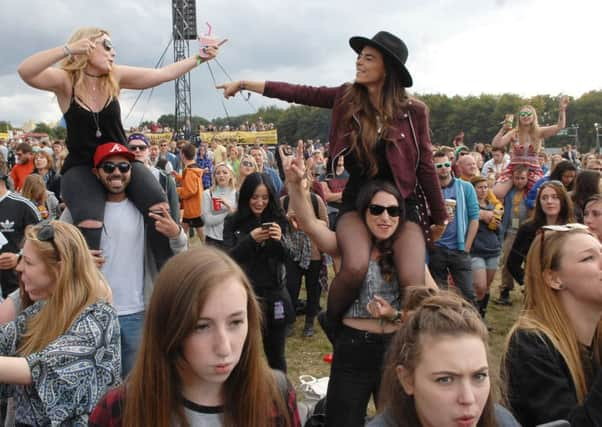The music festivals moving to a different vibe


There will be some of you reading this who couldn’t imagine anything worse, but there are many people out there prepared to put up with the aforementioned privations, and pay good money in the process, if it means the chance of seeing some of their favourite bands and performers. I’m talking, of course, about rock music festivals.
It’s more than 45 years now since an estimated 400,000 youngsters descended on a field near the village of Bethel, in New York state, to hear the likes of The Who, Crosby, Stills and Nash and Jimi Hendrix. After three days and nights of sex, drugs and rock ‘n’ roll they headed home and the legend of Woodstock was born.
Advertisement
Hide AdAdvertisement
Hide AdNumerous other giant outdoor music festivals quickly followed such as Glastonbury, which is still going strong today. In fact these days the number of outdoor music festivals has mushroomed, with as many as a thousand in the UK alone.
It’s a topic that Dr Roxy Robinson, a festival consultant and lecturer at Leeds Beckett, explores in her new book - Music Festivals and the Politics of Participation - that charts how and why music festivals have changed over the decades.
She says the nature and appeal of them has been transformed since the 1990s. “Prior to the Millennium they were all about the counter culture and youth culture, but that’s changed as generations of festival goers have grown up and wanted something different,” she says.
This has led to an explosion of boutique festivals and the emergence of so-called “glamping” (luxury camping to you or I), aimed at an older, and more discerning festival-goer. Dr Robinson says one of the reasons for this proliferation was the clampdown on the rave scene. “It became much more difficult to put on underground festivals so some organisers moved into proper licensed festivals.”
Advertisement
Hide AdAdvertisement
Hide AdIn true free market style the increase in the number of festivals out there led to an upsurge in quality. “Commercialisation was seen as a bad word but in order to survive festivals have to make money, even though those from a hippie or counter culture background. Festivals have evolved and are now much more interesting and diverse,” she says.
Dr Robinson points to the success of the Burning Man festival in Nevada which has inspired a string of independent festivals in the UK, from the Boomtown Fair in Hampshire to the Beacons Festival, which was held in the Yorkshire Dales before becoming a more urban event in cities like Leeds and Liverpool.
That’s not all that’s changed. Whereas outdoor music festivals used to cater almost exclusively for rock fans now they have branched out into everything from folk music to opera, and beyond. “Many of the smaller festivals aren’t just about music, they’re also about food, art and books.”
But what is their enduring appeal? “There’s something British about it,” says Dr Robinson. “There are festivals elsewhere but Britain leads the way. I think the weather plays a part and because our summer is fleeting the impulse to go out and enjoy it is more intense.”
Advertisement
Hide AdAdvertisement
Hide AdWhat’s also true is that for some people, music festivals are as much a part of their holiday plans as a trip abroad. “When we had the financial crash in 2008 some people in the industry thought it would mean the end of music festivals. But it didn’t. People want that camaraderie and to be able to escape from their 9 to five existence for a few days.”
Music Festivals and the Politics of Participation, published by Routledge, is out now, priced £60.